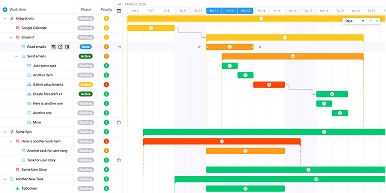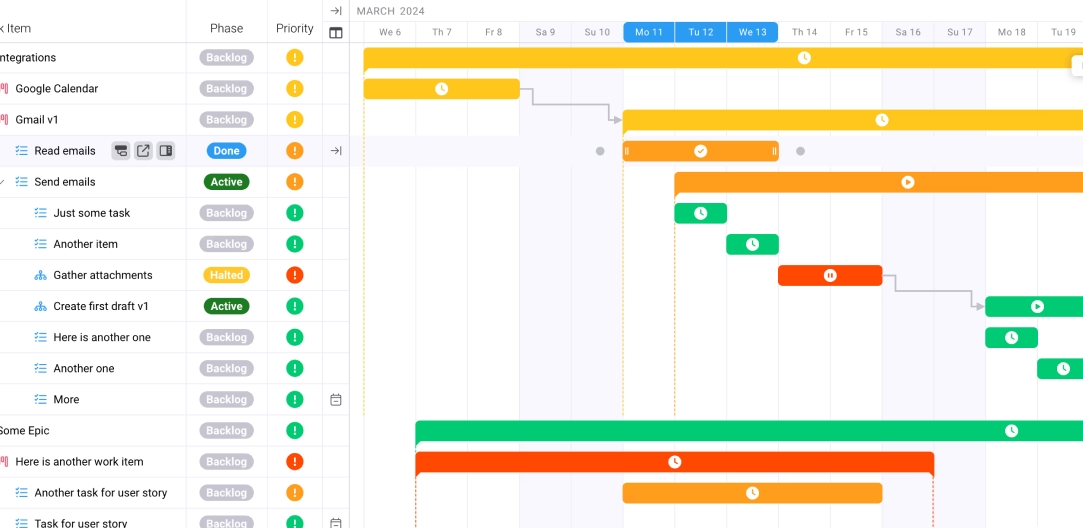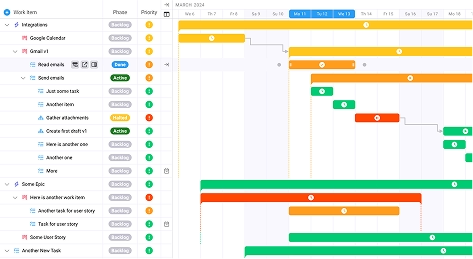
How COOs Can Optimize Project Management for Marketing Agency Growth
Key takeaways:
In the fast-evolving landscape of marketing agencies, Chief Operating Officers (COOs) are tasked with driving operational excellence to fuel growth. Optimizing project management for marketing agencies is key to delivering impactful campaigns, retaining clients, and scaling operations efficiently. By refining processes, leveraging technology, and empowering teams, COOs can transform project management into a strategic advantage. This article provides actionable strategies for COOs to enhance project management, positioning agencies as industry leaders in 2025 while drawing on high-authority insights to support a robust framework for success.
The COO’s Strategic Role in Agency Success
COOs are the operational backbone of marketing agencies, ensuring projects align with client goals and business objectives. Effective project management is more than meeting deadlines—it’s about building systems that enhance efficiency, foster collaboration, and drive profitability. According to a 2023 study by the Project Management Institute, organizations with mature project management practices achieve 2.5 times higher success rates. For marketing agencies, this means delivering campaigns that exceed expectations, boost retention, and increase revenue. COOs must focus on streamlining processes, adopting technology, and nurturing high-performing teams to create a scalable project management framework.
Streamlining Processes for Operational Excellence
Establish Clear Workflows and SOPs
Clear workflows are essential for efficient project management. COOs should develop standardized operating procedures (SOPs) for campaign planning, content creation, and client approvals. Structured workflows reduce inefficiencies and ensure consistent deliverables, particularly in pod-based team structures. By mapping out project phases—such as ideation, execution, review, and reporting—COOs can eliminate bottlenecks and improve transparency.
For example, a workflow for a social media campaign might include:
- Briefing: Define client goals and KPIs.
- Content Creation: Assign tasks to designers and copywriters.
- Review: Use a client portal for feedback.
- Execution: Schedule posts and monitor performance.
- Reporting: Analyze results against KPIs.
Standardized SOPs clarify roles and deadlines, reducing miscommunication and rework.
Adopt Agile Methodologies
Traditional methodologies like Waterfall are often too rigid for marketing’s dynamic needs. Agile approaches, such as Scrum or Kanban, provide flexibility to adapt to changing client demands. Agile’s iterative nature suits digital marketing, enabling real-time optimization. By organizing work into sprints, COOs can ensure faster delivery and continuous improvement.
For instance, an Agile team might test a campaign’s performance mid-execution, adjust strategies based on data, and deliver better outcomes. COOs should train teams on Agile principles and use tools that support sprint planning and task tracking.
Optimize Resource Allocation
Effective resource planning prevents burnout and balances workloads. Overcommitted resources often lead to missed deadlines. COOs can leverage resource management tools to forecast capacity, assign tasks based on expertise, and monitor team utilization. This ensures the right people are assigned to the right projects at the right time.
For example, analyzing past campaign data can help predict hours needed for a new project, ensuring designers and strategists are not overstretched. This approach enhances productivity and maintains team morale.
Leveraging Technology for Project Management Success
Invest in Integrated Software Solutions
A robust technology stack is critical for streamlining project management. Integrated software centralizes tasks, communication, and data, reducing silos and boosting collaboration. It’s worth considering tools that integrate with QuickBooks for seamless billing and financial tracking, which is vital for profitability.
Key features to prioritize include:
- Task Management: Real-time task assignment and tracking.
- Time Tracking: Accurate monitoring of hours via time tracking tools.
- Client Portals: Streamlined feedback and approval processes.
- Analytics: Dashboards for tracking KPIs like project completion rates.
Consolidating tools reduces complexity, saves time, and lowers costs.
Automate Repetitive Tasks
Automation scales operations by eliminating time-intensive tasks. COOs should identify repetitive tasks—such as report generation or content scheduling—and implement automation to free up team capacity for strategic work.
For example, automating performance reports saves hours weekly, allowing project managers to focus on campaign optimization. Automation also reduces errors, ensuring consistent deliverables.
Harness Data-Driven Insights
Data is critical for informed decision-making. It’s important to track KPIs like campaign ROI, client satisfaction, and team utilization. Using dashboards to visualize data, COOs can monitor project health and make proactive adjustments.
For instance, if a campaign’s engagement metrics underperform, the COO can adjust targeting or creative elements. Data-driven insights also build client trust by demonstrating measurable results.
Empowering High-Performing Teams
Foster Cross-Functional Collaboration
Collaboration between creative, strategic, and technical teams drives agency success. Optimized team structures with clear roles lead to exponential growth. COOs should create cross-functional pods—small, interdisciplinary teams dedicated to specific projects—to enhance communication and leverage diverse expertise.
For example, a pod for a PPC campaign might include an SEO specialist, content creator, and data analyst. Collaborative tools and regular check-ins ensure alignment and accountability.
Prioritize Continuous Learning
The marketing landscape evolves rapidly, with digital marketing trends like AI-driven advertising and hyper-personalization gaining prominence. COOs should invest in training on emerging tools and strategies, such as AI analytics or advanced SEO.
Workshops on AI-driven ad platforms, for instance, empower teams to deliver innovative campaigns. Continuous learning also boosts engagement, reducing turnover and fostering innovation.
Strengthen Client Relationships
Client retention is vital for growth. Transparent communication and proactive problem-solving are key strategies to boost retention in your marketing agency. COOs should ensure project managers use CRM tools to track interactions and provide regular updates.
For example, a client portal sharing real-time campaign progress builds trust and reduces miscommunication. Feedback loops address concerns promptly, fostering long-term partnerships.
Overcoming Common Project Management Challenges
Mitigate Scope Creep
Scope creep—when project demands exceed the original brief—is a common issue. When managing project deliverables it’s important to define scope clearly in contracts and use change request processes for additional demands. COOs should train project managers to negotiate scope changes and communicate their impact on timelines and budgets.
For instance, if a client requests extra deliverables, the project manager can propose an adjusted timeline or fee, preserving profitability.
Balance Speed and Quality
Agencies face pressure to deliver high-quality work quickly. Efficiency without sacrificing quality improves client outcomes. COOs can set realistic deadlines, use templates for repetitive tasks, and leverage automation.
For example, pre-built templates for email campaigns accelerate creation while maintaining brand consistency. Monitoring quality metrics, like client feedback scores, ensures high standards.
Scale Operations Effectively
As agencies grow, project management complexity increases and scalable processes are critical for managing larger workloads. COOs should implement cloud-based tools and standardized onboarding processes for new clients and team members.
Automated client intake forms and pre-set project templates, for instance, enable agencies to handle more clients efficiently without compromising quality.
Driving Continuous Improvement
Monitor Key Performance Indicators
Tracking KPIs is essential for measuring project management success. Regular reviews of weekly KPIs like task completion rates, budget adherence, and client satisfaction help COOs identify trends and address issues proactively.
For example, if task completion rates drop, the COO might investigate resource allocation or workflow inefficiencies. Consistent monitoring aligns project management with agency goals.
Conduct Post-Project Retrospectives
Retrospectives drive continuous improvement by gathering feedback from teams and clients, and can help to refine processes. COOs should facilitate open discussions to identify successes and areas for improvement.
For instance, if delays stem from unclear feedback channels, a client portal can streamline approvals. Retrospectives foster adaptability and growth.
Align with Strategic Objectives
Project management must support broader agency goals, such as expanding market share or diversifying services. Aligning operations with strategy drives long-term success. COOs should ensure projects contribute to these goals, such as by prioritizing campaigns showcasing expertise in emerging trends.
Focusing on AI-driven campaigns, for example, can position the agency as a market leader, enhancing brand reputation and attracting new clients.
Conclusion: Building a Future-Ready Agency
Optimizing project management for marketing agencies is a strategic imperative for COOs aiming to drive growth in 2025. By streamlining processes, leveraging technology, and empowering teams, COOs can create a framework that delivers exceptional results. From adopting Agile methodologies to harnessing data-driven insights, these strategies lay the groundwork for scalability and innovation. By aligning project management with agency objectives, COOs can position their organizations as industry leaders, ready to navigate the opportunities and challenges of the modern marketing landscape.









